Female nurses
behind reunions during the pandemic
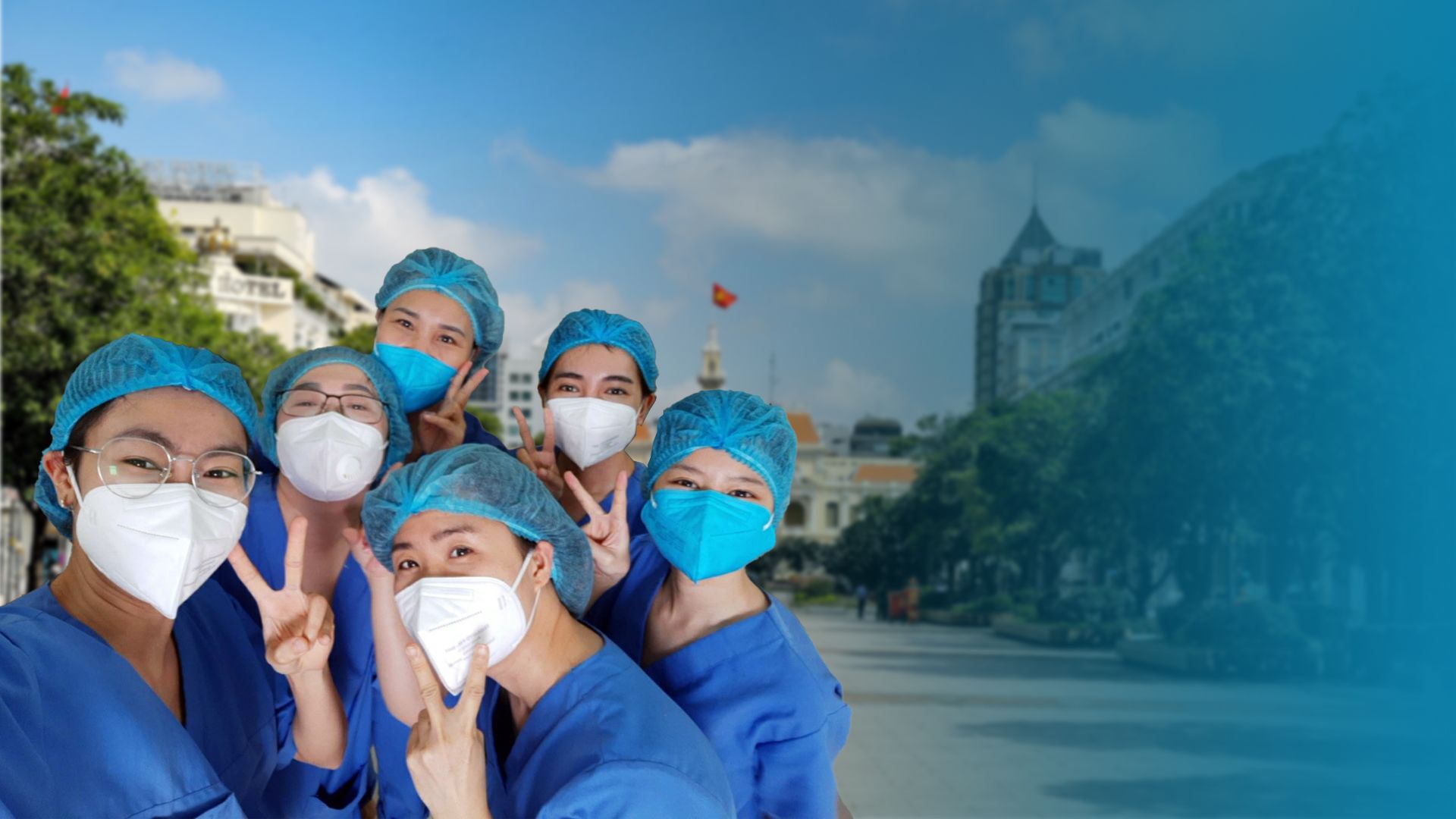
Hiding hardships and sacrifices, the COVID-19 pandemic has turned 'white blouse' soldiers into "heroes", rolling into the pandemic hotspots, tirelessly devoted. The "heroic" female nurses and doctors during the pandemic have contributed to portraying the image of Vietnamese women.
Nurse Nguyen Thi Que's luggage back home was handwritten letters, thank-you messages and a long string of patient phone numbers. Hidden deep in the pain, looking at Ho Chi Minh City has gone through the most traumatised days, she feels happy because she has contributed "a part of the effort to the reunions".
"If I cry, the patient knows who to lean on..."
On July 13, nurse Nguyen Thi Que, from Department of General Internal Medicine of Quang Ninh Provincial General Hospital, sent her two children to stay with their grandparents so she could travel to Ho Chi Minh City to help the city battle COVID-19. Her husband works in the army, unable to arrange time to take care of the children regularly as she went to work without knowing the return date.
Arriving in Ho Chi Minh City, Que and her teammates were on duty at Field Hospital No.6 in District 3. In the first two days, the team fell into confusion and fear because they had never witnessed such a "catastrophe" of patient overload. At that time, with the number of protective suits brought, the members of team divided among themselves, saving little by little because everything was very poor. Not saying it aloud, but in everyone's heart, a fear was rekindled when the number of hospitalised patients increased dramatically.
One person needs take care of up to a hundred patients at the same time with all kinds of conditions, from mild to severe . Medical orders are issued continuously by the doctor, and the nurse must remember every case to monitor and take care of. “It was an unimaginable shock. Everything happened very quickly, very dangerously and tragically. There are patients, I just met them, monitoring their SpO2 index was still good, the patient was still interacting with me, but when I came back to visiting after a while, they fell into respiratory failure, critical. I have never seen life be so fragile.”
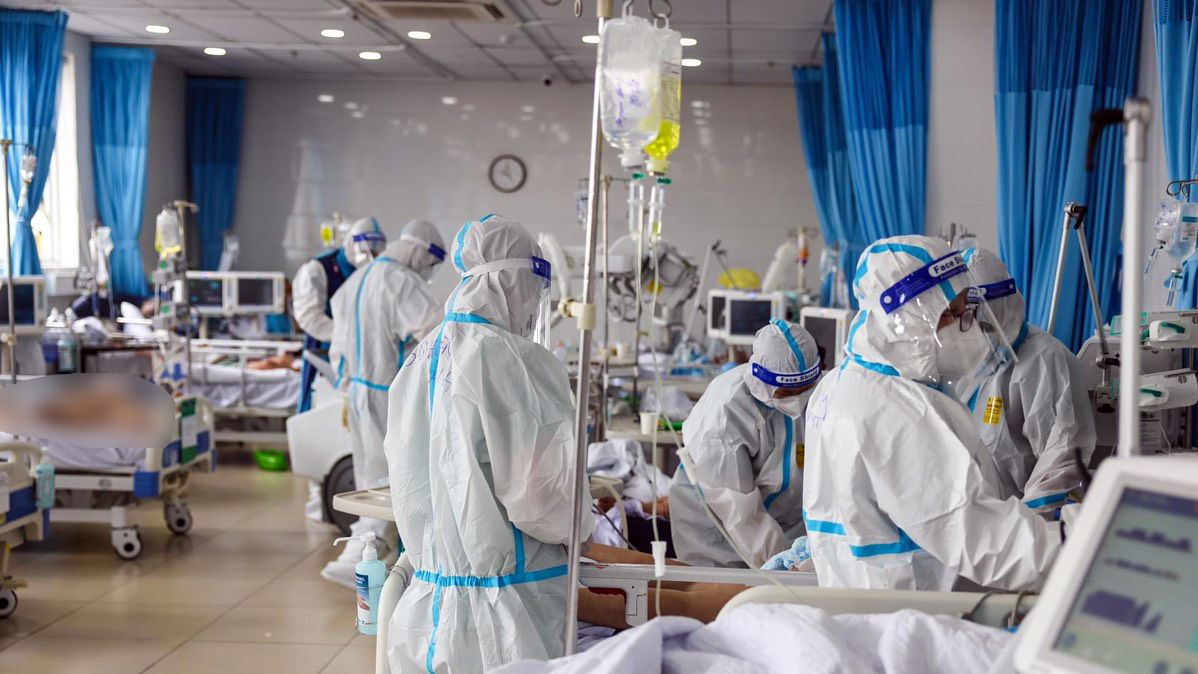
Photo: HAI AN
Photo: HAI AN
The night in Ho Chi Minh City continuously poured rain, the sound of the ambulance became a haunting sound for the medical staff every time the ambulance carried a patient to the hospital for emergency. The first case that Que directly received was a very young patient. On admission, the SpO2 index was 92, and was given oxygen. However, at that time, it was very difficult to find oxygen tanks and hospitals were in a state of lack of equipment and machinery to support patients’ breathing. Only two hours later, the patient's serious condition was forced to be transferred to Thu Duc Hospital and did not survive.
I was shocked and had to hold back my tears. Patients will only look at me to have more faith in life. If I cry, who does the patient rely on? Sometimes, I hide my face in the corner of the wall and cry because I love the patient so much.
Que describes her life in those days as hectic and suffocating, every step was a run. Everything from logistics to daily life to professional work is encapsulated with the word "very fast". The work wheel sometimes makes her exhausted, sometimes very tired, but she only dares to sit down for 10 minutes to have to return to the wheel. Pausing for only a few minutes, she had the feeling that more patients would slip out of her hands.
After the first six days of being in a state of shock, Que and her teammates were transferred to manage patients at the Field Hospital No.12. The second half of August was when Ho Chi Minh City fell into the fiercest situation. Here, the patients have been more numerous, but everything is better equipped and the procedures are also gradually methodical. Que and 74 teammates took care of more than 4,000 patients in building A and a few floors in building B. With that number of people, each medical staff have to take care of medical monitoring while caring for hundreds of patients, with each patients requiring different medical supervision and needing care like that of family in different spiritual aspects.
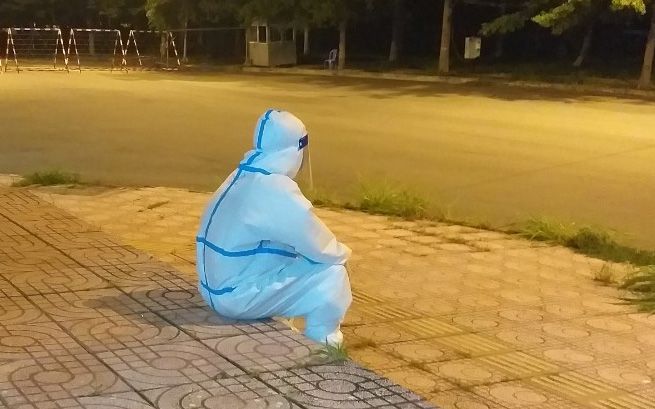
Photo: Que chose a private corner to cry for relief after watching the patient pass away.
Photo: Que chose a private corner to cry for relief after watching the patient pass away.
Every day, Que and her colleagues roll over hundreds of patients to help them circulate blood, take care of each patient's meals, and take care of everything from patient hygiene to personal needs on the spot. It is necessary to be really patient and loving for the patient to cooperate. Just like that, they whirled around in the work of a nurse with the always-hustle situation.
Difficulties and hardships are only health impacts for each medical staff. But the loneliness of those who leave when there is no loved one by their side, and those who just yesterday had a positive signal but have now suddenly died, is the psychological pain that makes them just want to give up.
With each passing day, the pain increases. Especially for someone who works in an emergency room like Que, seeing the patient no longer have the chance to live is very painful. Many patients were promoted to the upper level but did not survive. There are patients who do not dare to transfer because they know that having to transfer means their condition is serious. They think, going to a higher treatment floor, the chance of survival is very slim. On the emergency routes, many patients were afraid to cry, whispering urgent words: "Help me".
On those transfers, most of the patients with a little consciousness were shaking, Que could not do anything but hold their hands tightly. Patients now see medical staff as their last hope. “We can't hold back no matter how hard we are, the pain is indescribable, our eyes are blurred. We only know how to try to encourage the patient to focus on breathing to overcome the door of death," Que shared. There are cases of people who have died in extremely painful circumstances when they were still healthy in the morning, but by the afternoon they had coughed up blood, and all vital signs were lost.
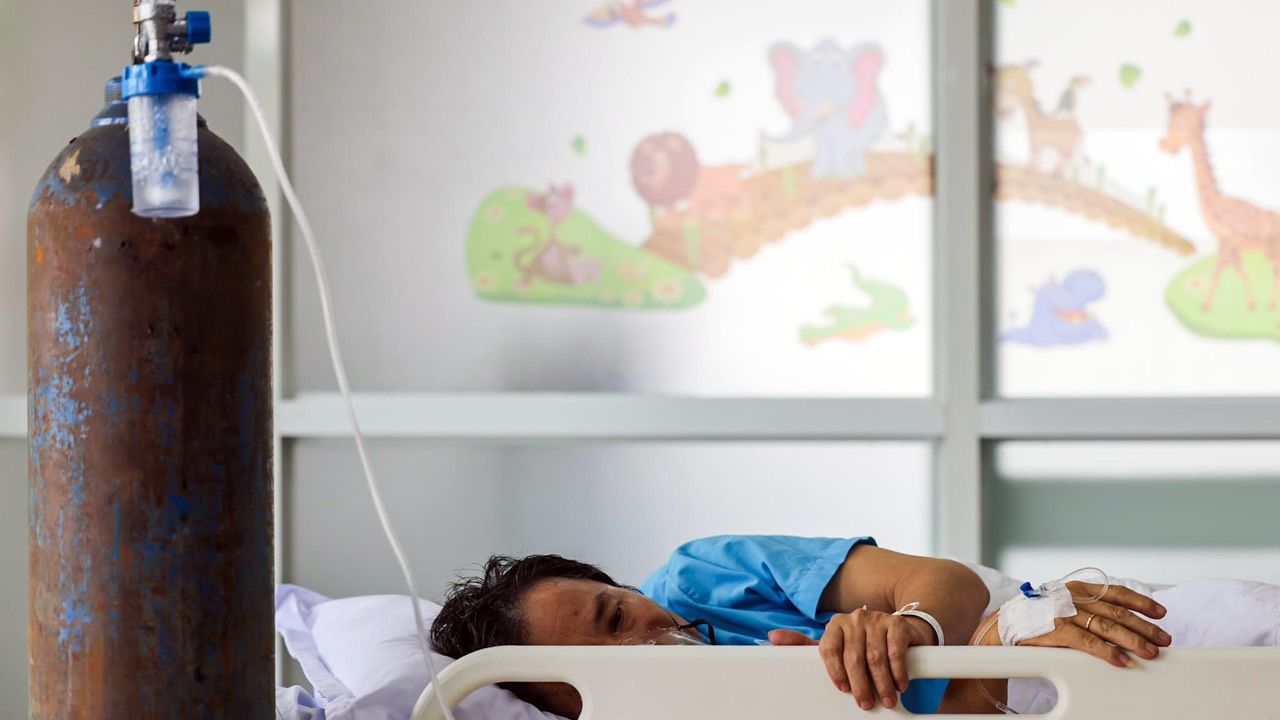
Photo: Hai An
Photo: Hai An
The image of a patient dying at the hospital, dying in the ward but unable to be taken away because of the car connection really haunted me for the rest of my life. Every day, we cross the line between life and death of patients, passing wards where the living lie next to corpses that have not yet been taken away. If you don't have the courage, it's extremely difficult to continue the work.
“Fate arranged me to become a special relative of patients”
In the COVID-19 emergency and treatment area at Field Hospital No.12, nurse Nguyen Thi Que and other members from the assistance group from Quang Ninh Province became familiar with their roles as relatives of patients. Sometimes they were like the children of the elderly, sometimes they become reluctant nannies for children treated separately here and those who were lonely because their parents were in critical conditions. Many old people wanted to adopt Que as their child.
Patient Ho Buu Phuoc, along with her daughter, son-in-law and grandchild, were hospitalised. Her condition worsened, so she was transferred to the emergency room. Initially, the patient showed very good signs and the medical staff were very happy. However, the next day, she deteriorated rapidly and was transferred to the Hospital 115 and then the Centre for COVID-19 Patient Resuscitation at the Ho Chi Minh City Oncology Hospital.
“When I took her away, I brought only a suit for her. The hospital required the payment of fees, but there were not any relatives. In order to help the patient get emergency treatment soon, I made an advance for her hospital fees. The amount was very small but necessary when the patient needs me the most”. In the following days, Que constantly contacted the old woman and encouraged her to make efforts to overcome the disease, so her family members also felt more secure.
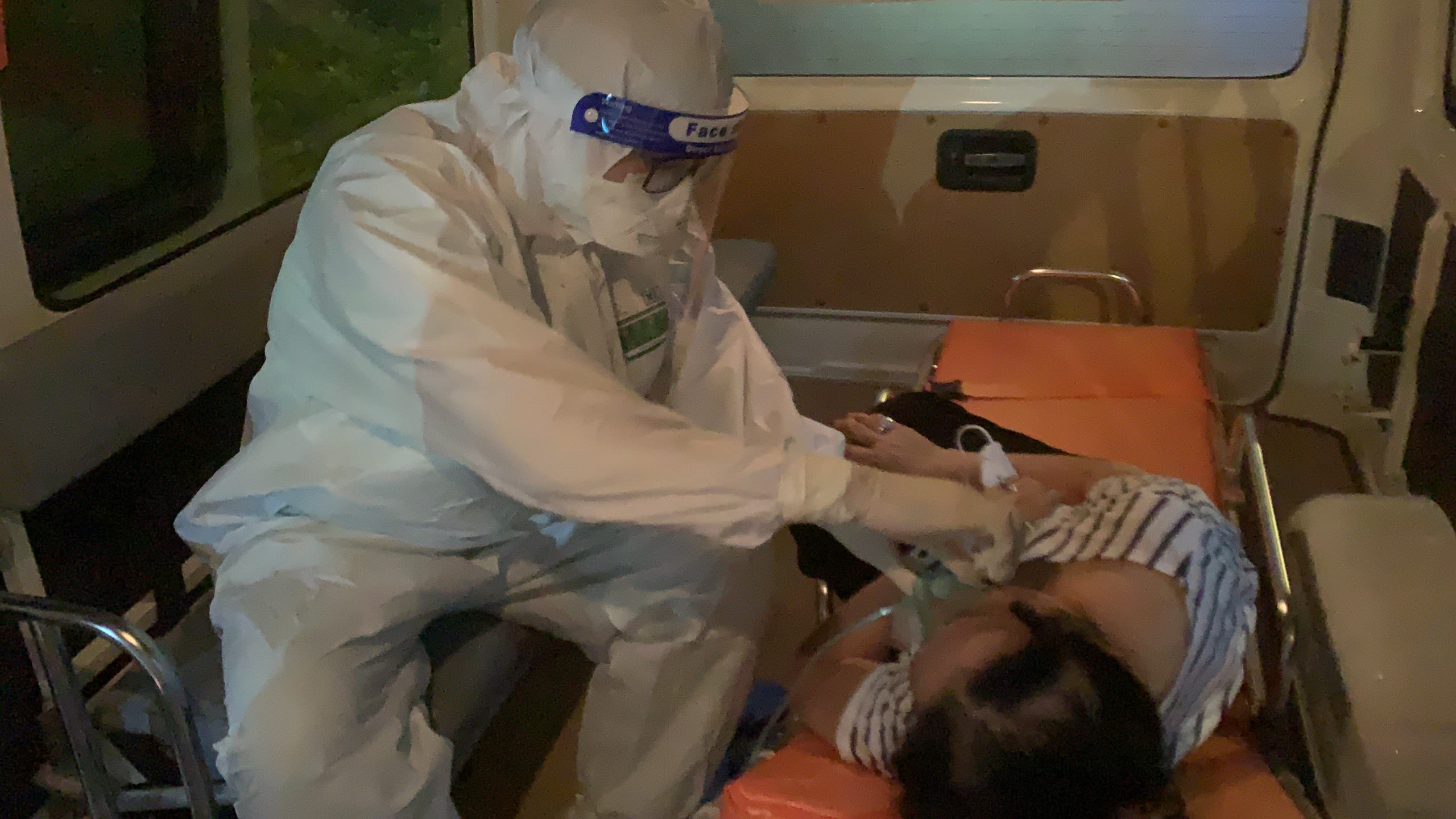
Photo: Each ambulance brought unforgettable emotions.
Photo: Each ambulance brought unforgettable emotions.
A month later, Que received the news that the old patient was discharged from hospital. She was very happy at the news and realised that her small support helped her get timely intervention to overcome the critical period. Sometimes she still called the old woman and encouraged her to overcome the psychological trauma because she understood that “the medical staff’s words were sometimes important than what the relatives said”.
In the emergency and treatment room for severe patients, the needed virtues were the perseverance and patience. Under high pressure of work, every day Que had to answer hundreds of questions such as: “Is this disease cured?”, “Am I ok?”. She had to face many patients in different disease conditions, psychology and emotions, even addicts and those who constantly resisted. “At that time, we had to patiently comfort the sick. The patients want to receive great attention and care as they do not have any relatives at their side. Even in the mid-night, when patient got worse, we had to support them at any time so that they felt secure for the treatment”, said Que.
The most touching images came from very young children who could not understand clearly what was going on when they had to follow their parents and relatives to the treatment area. Que remembered a three-year-old girl named Tram, who was hospitalised with her mother in a very pitiful situation. The “specialties” of the field hospitals in Ho Chi Minh City were COVID-19 and “kien ba khoang” (paederus fuscipes). Tram also fell into this very uncomfortable situation when her skin suffered from burning pain due to the venom of this kind of ant. She cried constantly; meanwhile, her mother had a respiratory failure and was treated in the emergency area.
“At that time, we did not know what to do because the workload was very large in a shift. Toys were not available, we had to use temperature lights to make “squeaky” sounds to distract the baby when she cried. We tried to find ointment to make the wound not spread. We gave milk, fruits and cakes to Tran and many other patients here to so that they would feel like they were being cared for by their relatives. When Tram had a negative test result and was discharged from the hospital, her mother was still treated in the emergency room. I was so happy that I burst into tears while witnessing the girl fell into her father's lap”.
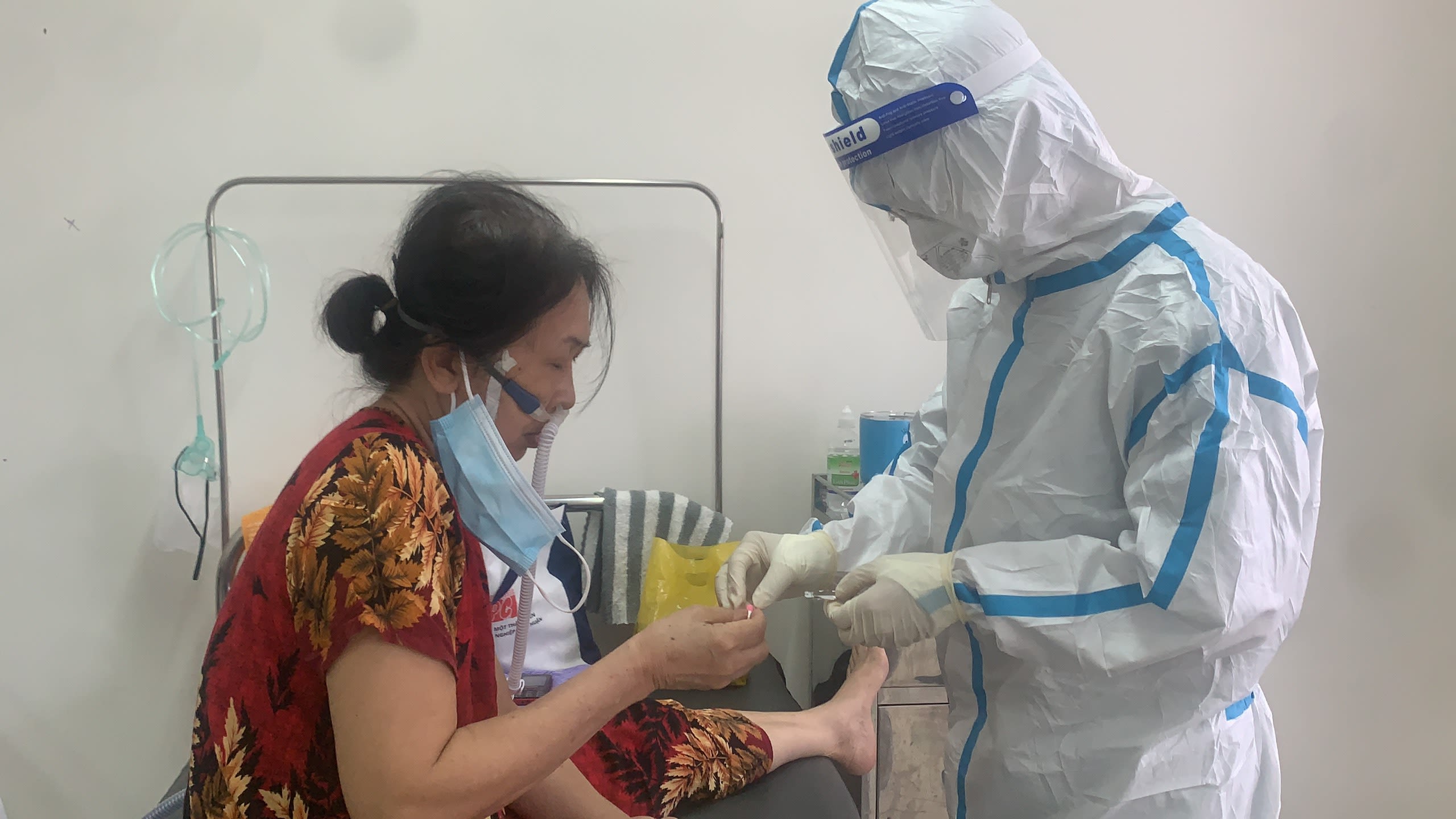
Photo: The recovery of a patient is a great encouragement to doctors and nurses like Que.
Photo: The recovery of a patient is a great encouragement to doctors and nurses like Que.
As a special arrangement, the emergency room was always located next to the area for discharged patients. Although they were always busy in the emergency room, Que and her colleagues seem to be more motivated as seeing their patients wave goodbye to return home. Que was very touching as saying: “The dearest and happiest moment was to see a patient say goodbye to return home”.

“Going together, we must return together”
In mid-September, the emergency room of Field Hospital No.12 began to see positive changes. In the initial days, the emergency room received more than 30 patients per day, but by mid-September, the number of emergency cases was reduced by half while severe cases were also greatly reduced. That were positive signals for Que and her teammates to feel relieved and to release a lot of pressure that Que said she would never want to witness again in her life.
On September 22, Que met the necessary conditions to return home. But a female doctor in the team was found to be an F0 and had just tested negative for the first time, so Que decided to stay. “When we left for Ho Chi Minh City, we said to each other that we go together and have to come back together. Our team has two women, I can't go back first because I care for her very much. Although she was still very tired when she got a negative result for the first time, she still tried to go to work and treat patients. I am still healthy, so I cannot be the first to leave the front to go home,” Que said.
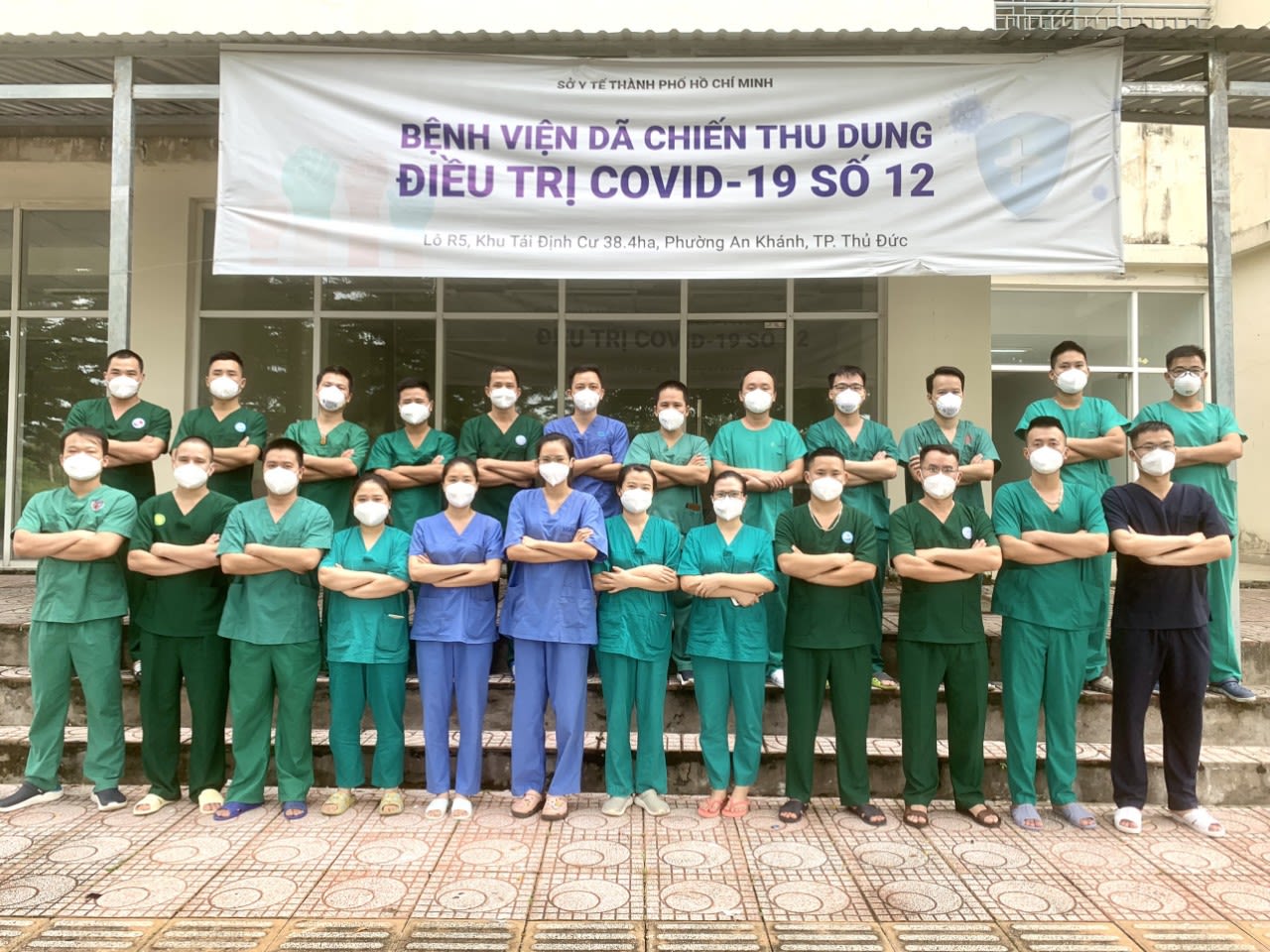
Photo caption: Que and her teammates have completed the task of supporting the Field Hospital No. 12.
Photo caption: Que and her teammates have completed the task of supporting the Field Hospital No. 12.
On September 30, Que’s colleague continued to get a negative result for SARS-CoV-2. The day she left Ho Chi Minh City she brought a mix of emotions with her. “I feel sadder because I am getting used to the work cycle, getting used to the patients and feeling like I have become a resident in this city. I thought, should I stay for one or two more months until the whole team comes back. The people there are still suffering from the consequences of the pandemic.”
Que said that she should thank the life for the recovery of her patients. Because, if they do not try to overcome, have no desire to live, or give up at the most critical moment, medical workers cannot do anything. “I visited a few patients after they recovered. I also thank many patients because if they do not have the will to live, we cannot do anything else. Because they have the motivation, we have the strength to fight through it,” Que noted.
Que's phone stores a lot of patient numbers. She names patients with many cute names, sometimes associated with the emergency date, sometimes with a certain mark in the treatment process. Although she is a very skilled nurse, after 70 days of almost exhausting herself on the front lines, she found herself tougher and more experienced in treating people and thinking about life differently. “My thought is no longer limited to the need to have a perfect and rich life, just being able to breathe is happiness. No matter how difficult, how hard it is, as long as you have the desire to live, everything will come to you,” Que said.
During busy days, she always tried to pick up the phone to speak with her mother, husband and two children. “My mother calls me every day, sometimes it only takes two seconds to know that I am safe. Until the end of the mission, my mother said: When you come here, can I sleep well.” And during the days in the isolation areas, she found herself becoming redundant. She can bear hardships and difficulties, but isolation is uncomfortable. Now she can rest after many hard days, she feels sorry for the sick and misses her colleagues who are still working at the hospital.
Returning home, Que packed all the images, including pain, loss and even the smallest happiness, and kept them in a corner. Sometimes in her spare time, she reads letters from patients or phones her patients to nurture positive emotions after more than two months of witnessing the fiercest things in her life as a medical worker.
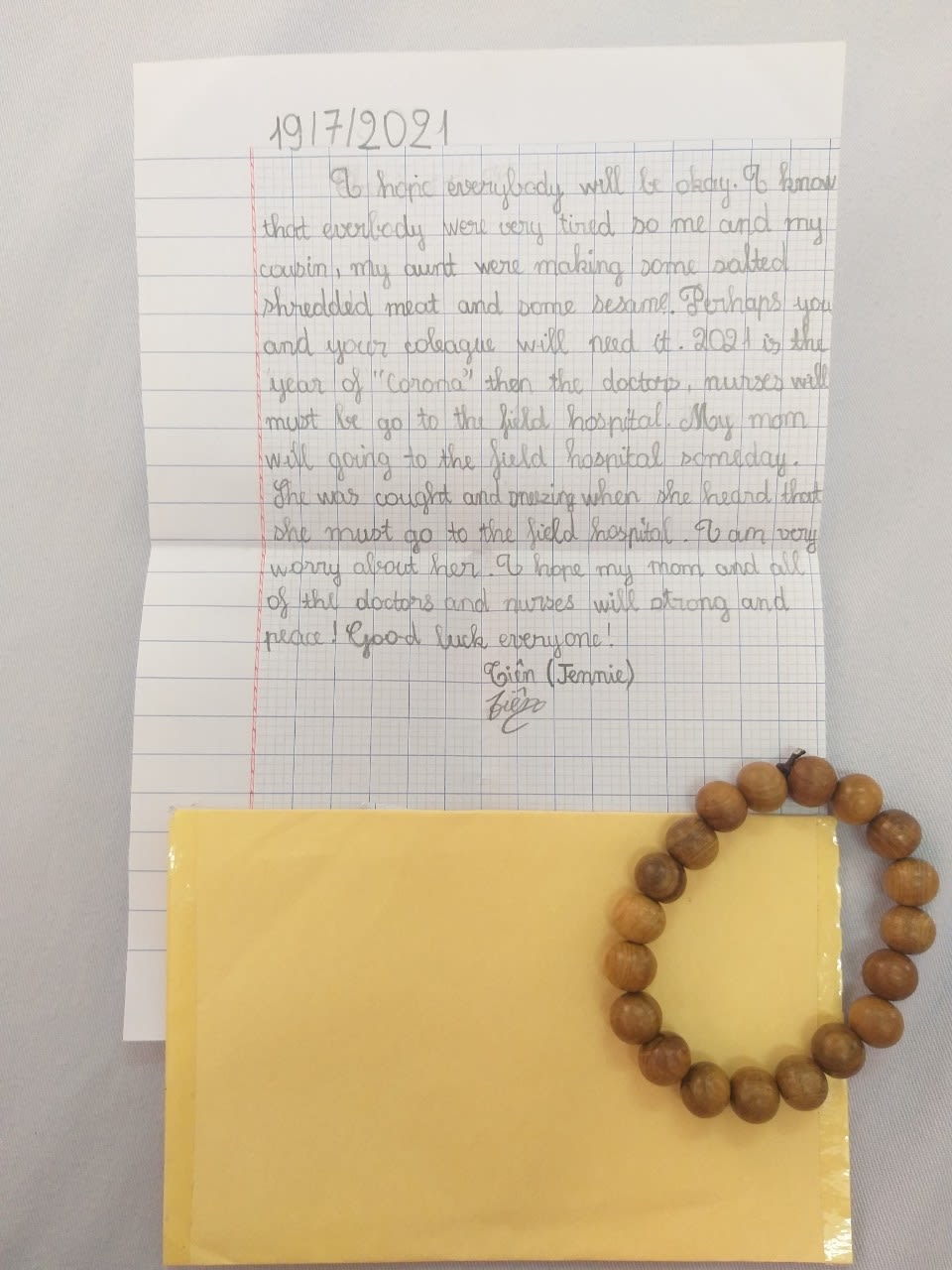
Caption: Many letters she brings with her on the return trip, keeping them to remind her of the fiercest time in her medical career.
Caption: Many letters she brings with her on the return trip, keeping them to remind her of the fiercest time in her medical career.
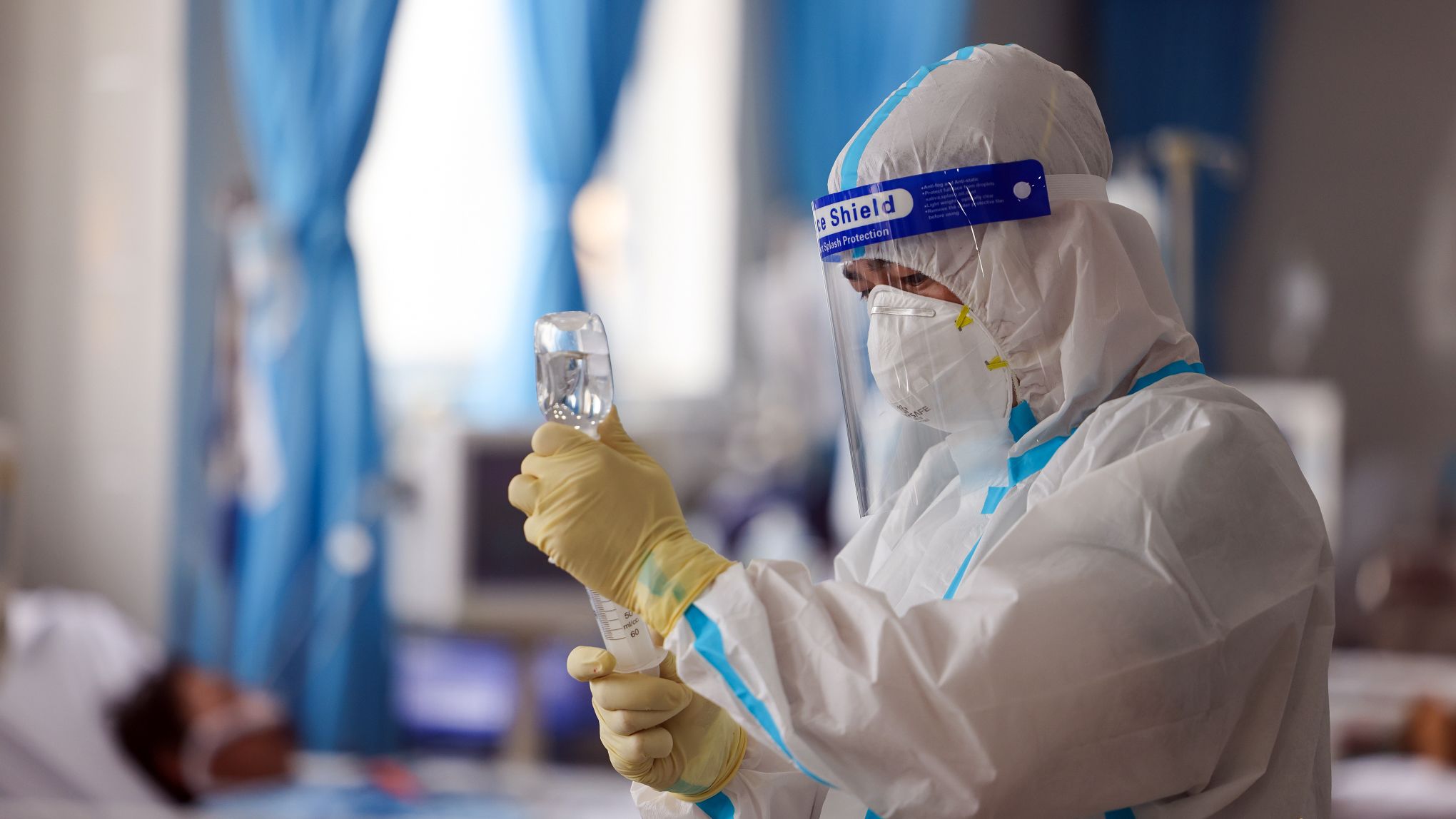
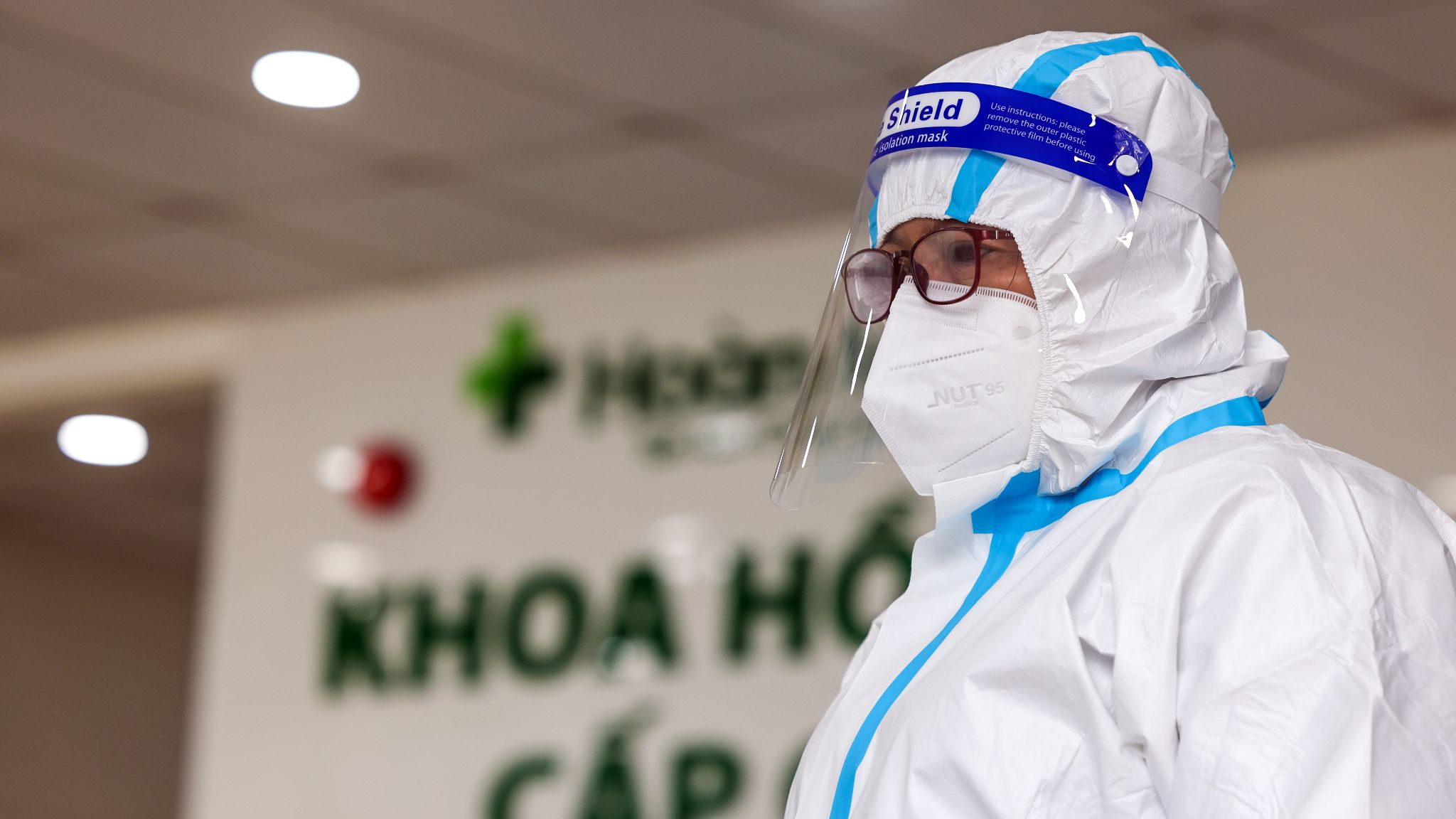
Production Manager: VIET ANH
Content: THAO LE, THIEN LAM
Translation: THUY LINH, KIM LINH, THUY TRAN
Design: DUC DUY, PHAN ANH
Photos: NGUYEN THIEM, HAI AN, NGUYEN THI QUE